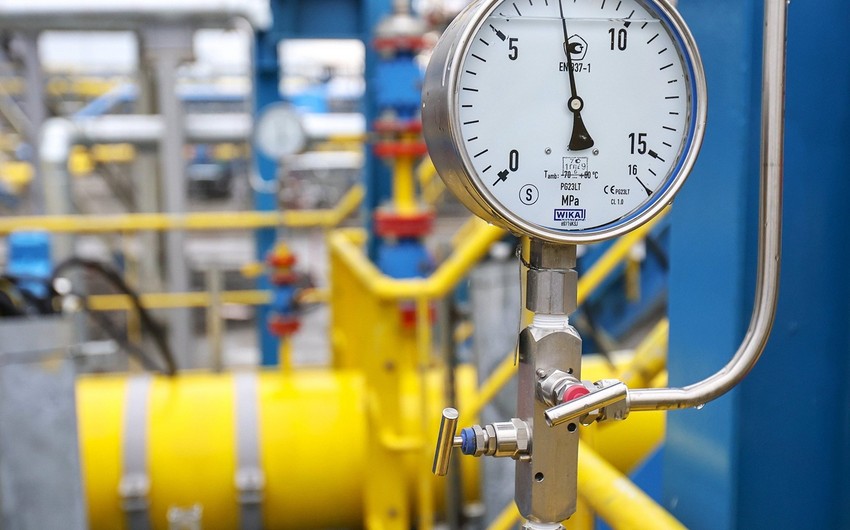Azerbaijan's Economy in 2022: Challenges, Achievements and Expectations
- 29 December, 2022
- 11:32

The crisis situation that has developed in the global economy, first under the influence of climatic anomalies - droughts, floods, harsh winters - and further due to the coronavirus pandemic, has further aggravated this year due to the war between Russia and Ukraine. On the one hand, the conflict accelerated the process of rising energy prices, stimulating global inflation, and on the other hand, created food shortage.
Curbing inflation has become a top priority
Inflation this year reached the double digits for the first time in the history of the eurozone. In Germany, inflation hit a 71-year high. A similar situation has developed in the United States. The inflationary pressures did not bypass Azerbaijan. Rising inflation in trading partner countries had both direct and indirect (through producer prices) impact on consumer prices in Azerbaijan.
Most of the world's central banks have tightened their monetary policy, systematically increasing the discount rate, and setting inflation as a top priority. Azerbaijan is no exception in this sense. The Central Bank of Azerbaijan has raised the discount rate three times since March, bringing it to 8.25%. According to the regulator's latest report, annual inflation rates have declined in line with the projected trajectory. The 14% decline in world food prices over the past 6 months, the relative slowdown in weighted average inflation in partner countries have affected the decline in inflation in Azerbaijan in recent months.

Inflation forecasts for next year are optimistic
Azerbaijan's importance in the energy security of Europe has increased even more.
The question of whether Europe's dependence on Russia for energy supplies is a threat to the energy security of the 'Old Continent' has not subsided over the past few years. But thanks to the tenacity of Germany, which was particularly dependent on natural gas imports from Russia, the Nord Stream 2 pipeline could advance to where it is today. However, the situation changed dramatically after February 24 (the start date of Russian aggression against Ukraine). First, the United States, Great Britain, and then the EU countries refused to purchase oil and natural gas from Russia.
On the way to reduce Russia's dependence on natural gas, Europe considered Azerbaijan, along with the US and Norway, as an alternative partner. A striking example of this is the signing of a Memorandum of Understanding between Azerbaijan and the European Union on strategic partnership in the field of energy.

Azerbaijan, which has been exporting crude oil to Europe for many years, has established itself as a reliable partner. The new agreement will significantly strengthen Azerbaijan's role as a reliable partner in ensuring EU's energy security.
The Strategic Partnership Agreement for the Development and Transmission of Green Energy between the Governments of the Republic of Azerbaijan, Georgia, Romania and Hungary is of great importance for ensuring Europe's energy security. Azerbaijan's onshore wind and solar energy potential of more than 24 gigawatts promises ample opportunities for development of this industry, and relevant work in this direction continued this year.
Thus, the foundation was laid for the Garadagh solar power plant with a capacity of 230 MW and the Khizi-Absheron wind power plant with a capacity of 240 MW.
In addition, the Ministry of Energy of Azerbaijan and BP signed an addendum to the executive agreement concluded in June 2021 to take further steps for the joint implementation of the 240 MW solar power plant project in Jabrayil.

Azerbaijan is also beginning to play an important role in the diversification of European crude oil supply chains. In January-November of this year, a number of European countries sharply increased their purchases of crude oil from Azerbaijan. High oil prices provided a large profit from its sales.
According to the data, 92% of exports come from this sector. As can be seen, the oil and gas sector is still the driving force of the Azerbaijani economy and the main source of income.
The development of the non-oil and gas sector accelerated
The positive dynamics in non-oil exports has been preserved this year. From January to November of this year, exports of non-oil products grew by 14% compared to the corresponding period of the previous year and reached a record high of $2.688 billion. This goes on par with the growth in the non-oil and gas sector compared to the previous year. Value added in the non-oil and gas sector surged 9.2% over the reporting period.

The annual value of Azerbaijan's non-oil exports this year is expected to exceed $3 billion for the first time. The volume of GDP in this sector grew by only 6.4% compared to January-November 2020. Of particular note is that the share of SMEs in non-oil exports reached 66%.
Favorable environment has emerged for the development of the country's transit capabilities
Azerbaijan's location on the historically significant Silk Road speaks of the country's long traditions in the field of logistics. Here Azerbaijan acts not only as a transit country, but also as an initiator and executor of such projects as the Baku-Tbilisi-Kars (BTK) railway, the North-South international transport corridor.
The construction of new airports in the territories liberated from occupation, building ships, the work carried out at the Baku International Sea Trade Port, the funds allocated for the diversification of the railway infrastructure, the construction and reconstruction of international highways, show that Azerbaijan is taking consistent steps towards becoming a transport hub.

Transit cargo transportation through the territory of Azerbaijan also increased. Over the first 10 months of this year, the total volume of transit traffic through the territory of Azerbaijan increased by more than 80% compared to the corresponding period last year. The difficult geopolitical situation in the region has significantly increased the importance of the Middle Corridor (Trans-Caspian International Transport Route). Over the same period, the export of Kazakhstan's products through this corridor increased by 6.5 times after Kazakhstan reduced metal exports through Russia and began to supply more metal via Middle Corridor.
The construction of the Zangazur Corridor continued, which will ensure the diversification of the Middle Corridor. Some 40% of the work within the framework of the construction of the railway, and 70% of the motor road infrastructure have been completed on the section of the corridor passing through the territory of Azerbaijan.
Rapid integration of Karabakh into the national economy will be ensured
Just like last year, in 2022, significant steps were taken to restore and reconstruct the lands liberated from occupation, and to quickly integrate these territories into the national economy.
Zangilan International Airport that has been put into operation this year will simplify cargo transportation.

Azerbaijan has one of the largest civil air cargo fleets in the region with 18 cargo aircraft. An additional 9 cargo aircraft are expected to be acquired over the next 10 years. Given that the volume of cargo transportation through Azerbaijan has increased, and the fleet of cargo aircraft is expanding, it is possible to say that the Zangilan airport will be one of the parking points for cargo aircraft. The presence of the airport will play an important role in the development of the region as a tourist hub.
At the same time, the I State Program on the Great Return to the liberated territories of Azerbaijan adopted this year will make a significant contribution to the implementation of the goals. For the next four years, it is planned to maximize the potential of the region, to form a sustainable transport and logistics chain.
Expectations on prospects for economic development are optimistic
Prices on oil - Azerbaijan's main export crude - are expected to rise next year. The average oil price is set at $50 in Azerbaijan's 2023 state budget. Given the fact that the average oil prices on the world market are predicted to be around $90, this can be considered quite comfortable in terms of budget revenues and forecasts for growth in the balance of payments.

A surplus of $17,710.6 million formed in the current account of Azerbaijan's balance of payments in January-September of this year, up 4.5 times from the same period last year. In the reporting period, the current account surplus amounted to 30.7% of GDP (15.2% in 12 months of 2021). The EBRD expects the share of the current account surplus in Azerbaijan's GDP to be 31.7% this year, which means that the volume of goods and services exported by the country exceeds the volume of imports. Today, the positive balance and its share in GDP are an indicator of the level of Azerbaijan's international competition and confirmation of its status as a creditor.
The reforms carried out by the end of this year are expected to lead to the reduction of the share of external debt in GDP to 10%. At the same time, the excess of foreign exchange reserves of external debt by 8 times forms a reliable safety cushion and makes it possible to adequately respond to possible shocks.
